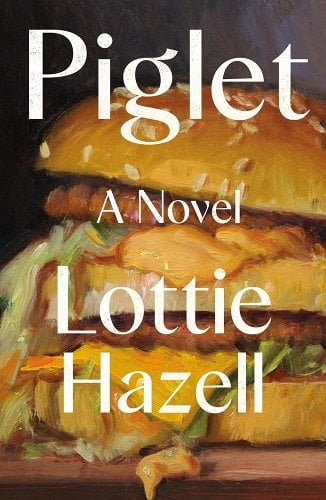
Piglet was sweating, and the supermarket chill was welcome on her breastbone, her back. Waitrose was full: shiny four-by-fours filling the car park, Saturday-morning shoppers with reusable bags jostling in the aisles.
Oxford was at the end of a heat wave, the novelty of sun-warmed skin worn, and the city was coated in the kind of grime that accumulated in weeks without rain. Outside, Piglet had watched from behind her sunglasses as a man and woman screamed at each other through their open car windows about a parking space.
Even in the cool sanctuary of the supermarket, the mood was irascible. A woman wearing Birkenstocks and ecru-coloured linen pushed past Piglet, reaching for a pecorino.
But guests would be arriving at six, and she didn’t have time to seethe among the cheeses. As she shopped, her fiancé, Kit, would be unpacking their house. Those words—still a novelty, like the stairs, the garden, the mortgage. Piglet stooped to pick up a block of feta and added it to her basket.
It had been her idea—a small housewarming supper for six—and he had been as excited as she was to show off their empty rooms, their white walls, their space. “We can invite Seb and Sophie,” he had said. “And Margot and Sasha,” she added. He had shrugged.
Texts had gone out, and boxes of saucepans, serving platters, and spices had been located, opened, and unpacked. Margot had replied immediately—“You’ve just moved in, shall we get pizza?”—but Piglet had insisted: “I’ll cook.”
She picked up salted butter, thick Greek yoghurt, and cream.
The menu was not modest. Her basket was already heavy with Charlotte potatoes, fresh herbs, and a Duchy chicken.
It was too hot for a roast chicken, but Piglet had once heard Nigella say something about a house only being home once a chicken was in the oven. And anyway, there would be salads: one chopped and scattered with feta and sumac, another leafy with soft herbs. New potatoes, boiled and dotted with a bright salsa verde. Bread and two types of butter: confit garlic, and Parmesan and black pepper. There would be cold wine and open windows, patio doors thrown wide. It would all look and taste exquisite.
There had been roast chickens back in Derby, but her mother’s were always anaemic, trussed at the legs and moistened only by a gravy that had started life as a spoonful of granules. For dessert—or afters, as her father would say—there would be an apple pie from the Morrisons bakery or a roulade from the frozen aisle, depending on the season, eaten on the sofa in front of the television. Between bites, Piglet’s family—her parents, her sister, herself—would call out the answers to quiz shows, spoons scraping in their bowls. Piglet knew her parents still ate her mother’s roast chicken every Sunday. On Saturday it was a takeaway—Chinese, from the shop in town—and on Friday it was fish. No matter the weather, no matter the time of year. These routines, which had once cradled their familial bonds, their Sunday traditions, now made Piglet feel a crawling embarrassment, a creeping pity. She had learned since she left Derby, left her parents, that the only way to serve a dessert from the frozen aisle was ironically.
When she had met Kit’s parents, they had served a roast rib of beef. Richard had carved, and the blackened bones, which had stuck into the air, shook as he sliced. When Cecelia apportioned herself a single slice and a heaping of steamed cavolo nero, Piglet had done the same. They had discussed art over dinner—Warhol at the Ashmolean—and Piglet had nodded, beamed, and spoken
about Campbell’s Soup Cans to sympathetic smiles. Kit and Richard ate second helpings with their fingers. Cecelia had sighed, the corners of her lips curling: “Boys.”
Piglet’s dinner would not be like her mother’s or her future in-laws’. There would be jazz music, cigarettes smoked on the patio, and a dessert made from one of the new cookbooks she was
editing: an espresso semifreddo with warm caramel sauce and glinting shards of praline. There were easier recipes she could have made—she could have bought dessert, pudding, even—but she did not pass up an opportunity to mention one of her authors by name on the off chance someone might ask for the recipe.
At the checkout, Piglet stood behind a woman with two young boys. They were hanging on the woman’s arm, whining about sweets, swinging backwards and forwards, catching glances from the other shoppers before raising their voices, eyeing their mother as she moved groceries from trolley to till with her remaining hand. Piglet tried to catch the cashier’s eye: this was Waitrose.
The woman didn’t look at her children as she transferred crisps in brightly coloured packaging to the conveyor belt. Cereal, sliced white bread, ice cream. Piglet eyed the shopping, and then the children. She glanced at the cashier again. By the time Piglet’s organic chicken had reached the till, the children were quiet. They had each been handed a fluorescent bag of Nik Naks, torn from their multipack. They grinned at each other, their fingers dusted orange, pulped corn between their teeth. The woman paid, left, and Piglet positioned herself to receive her groceries and compliments on her choice of food. The cashier looked up at her, smiling, inclining her head. “Boys,” she said, before she pushed the chicken through the till.
*
“They’re not going to notice if a bit of skin’s gone.” Kit, his eyes dark with desire, was naked besides his boxers, a pair of yellow rubber gloves. The chicken—a long-legged bird with feathers still clinging to its thighs—had just been removed from the oven, and the kitchen was shimmering with heat. The room was empty, walls white, boxes spilling Tupperware stacked where a table would eventually stand. Kit stood behind Piglet, her skin also bare save an apron strung over her underwear, and she felt the heat of him on her back.
“I thought you were doing the bathrooms,” Piglet said as she inspected the bird, her body bending into his.
“They’re done,” Kit said. “Doesn’t take long when they’ve never been used.” With his arms around her, he began to remove his gloves, pulling a finger at a time until his hands were uncovered and inching towards the chicken, its brown skin crisp. Piglet turned to face him.
“Not for you,” she said, leaning closer to his face, gently biting his lip, tasting salt. He smiled, and she felt his lips pull wide, away from her. “I’ve been saving this for us, though.”
Piglet pulled a near-empty round orange Le Creuset pot towards her. She scraped a spoon around its edge and lifted it to Kit’s mouth. His eyebrows contracted, his lips.
“Good, isn’t it?” Piglet said, smiling as Kit groaned. “Coffee custard for the semifreddo.”
Kit took the pot from the stove and cradled it like a child as he folded his legs beneath him, sinking to the floor of their empty kitchen. He slapped the space next to him, and Piglet sat. Kit scraped another half spoonful of custard from the pot and held it to Piglet’s lips. She swallowed: a child taking medicine, a communicant receiving the Eucharist.
“Is it too late to uninvite everyone?” he asked.
“You know what? Maybe not.”
They sat cross-legged on the floor, the tiles cool beneath their hot flesh, passing the Le Creuset between them, spoon discarded, grinning and sticky-knuckled, custard on their fingertips.
__________________________________
From Piglet by Lottie Hazell. Used with permission of the publisher, Henry Holt and Co. Copyright © 2024 by Lottie Hazell.


